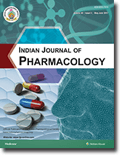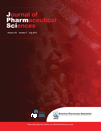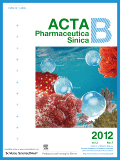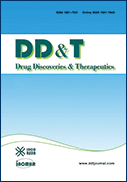
JOURNAL OF PHARMACY AND PHARMACOLOGY
Scope & Guideline
Connecting researchers to the pulse of pharmaceutical innovation.
Introduction
Aims and Scopes
- Pharmacological Mechanisms and Drug Action:
Research articles often delve into the molecular mechanisms underlying drug actions, exploring how various compounds affect biological systems at the cellular and molecular levels. - Traditional Medicine and Phytochemistry:
A significant focus is placed on the pharmacological evaluation of traditional medicinal plants, investigating their bioactive compounds and therapeutic potentials. - Drug Delivery Systems:
The journal highlights innovative drug delivery technologies, including nanotechnology, liposomes, and 3D printing, which aim to enhance bioavailability and therapeutic efficacy. - Network Pharmacology and Systems Biology:
There is a growing emphasis on network pharmacology approaches to unravel the complex interactions between drugs and biological systems, supporting a systems biology perspective in pharmacological research. - Clinical and Preclinical Studies:
The journal publishes both clinical and preclinical studies, providing insights into the therapeutic effects and safety profiles of various pharmacological agents across diverse disease models. - Pharmacokinetics and Pharmacodynamics:
Research on the pharmacokinetic and pharmacodynamic profiles of drugs is essential, contributing to the understanding of drug absorption, distribution, metabolism, and excretion.
Trending and Emerging
- Integrative Approaches to Drug Discovery:
There is a marked increase in integrative approaches combining pharmacology, chemistry, and biology, particularly in the context of discovering novel therapeutics from natural products. - Artificial Intelligence and Machine Learning in Drug Development:
The application of AI and machine learning technologies for drug discovery and development is gaining traction, allowing for more efficient screening processes and predictive modeling. - Exploration of Gut Microbiome Interactions:
Research focusing on the interactions between the gut microbiome and pharmacological agents is emerging, emphasizing the importance of microbiota in drug metabolism and therapeutic efficacy. - Personalized and Precision Medicine:
The journal is increasingly publishing studies related to personalized medicine, including pharmacogenomics and individual variations in drug response. - Environmental and Sustainable Pharmacology:
There is a growing interest in the environmental impact of pharmaceuticals and the development of sustainable practices in drug formulation and delivery. - Innovative Drug Delivery Systems:
The exploration of novel drug delivery systems, including nanocarriers, smart hydrogels, and 3D-printed formulations, is rapidly gaining prominence in published research.
Declining or Waning
- Conventional Chemistry Approaches:
There has been a noticeable decrease in the publication of studies focused solely on conventional synthetic chemistry methods, as the journal increasingly favors interdisciplinary approaches involving biology and pharmacology. - Single-Target Drug Discovery:
The focus on single-target drug discovery is declining, with a shift towards multi-target and systems-based approaches that consider the complexity of biological interactions. - Basic Pharmacology Studies Without Clinical Relevance:
Research that lacks direct clinical implications or applications is becoming less common, as the journal emphasizes studies that bridge the gap between laboratory findings and clinical practice. - Traditional Toxicology Studies:
Publications that solely report traditional toxicological assessments without integrating novel methodologies or insights into drug safety are less frequently featured. - Basic Pharmacokinetics:
Basic pharmacokinetic studies are being overshadowed by more comprehensive research that combines pharmacokinetic data with pharmacodynamics and clinical outcomes.
Similar Journals

INDIAN JOURNAL OF PHARMACOLOGY
Advancing pharmacological knowledge for a healthier tomorrow.INDIAN JOURNAL OF PHARMACOLOGY, published by Wolters Kluwer Medknow Publications, is a premier platform dedicated to advancing the field of pharmacology and its related disciplines. With a rich history since its inception in 1978, this journal aims to disseminate high-quality research findings, reviews, and clinical studies that contribute to the global understanding of drug action and therapeutic practices. As a valuable resource for researchers, professionals, and students alike, it operates within the Q3 quartile of the Pharmacology category, positioning itself as an influential contributor in the realm of medical pharmacology. The journal is committed to publishing rigorous scientific inquiry, fostering innovation, and bridging gaps between laboratory research and clinical application. Readers can access its wide-ranging articles to stay informed about the latest advancements in the field, reflecting its crucial role in shaping future pharmacological research and practice.

Advances in Pharmacology and Pharmacy
Elevating Standards in Pharmacology and Pharmacy ResearchAdvances in Pharmacology and Pharmacy is a pioneering journal devoted to the dissemination of cutting-edge research in the fields of pharmacology and pharmaceutical sciences. Published by Horizon Research Publishing, this peer-reviewed journal boasts a commitment to advancing knowledge and innovation, making it an essential resource for researchers, industry professionals, and students alike. With an ISSN of 2332-0036 and an E-ISSN of 2332-0044, it provides a platform for high-quality research articles that explore new therapeutic approaches, drug development strategies, and the regulatory aspects of pharmaceutical science. Although currently lacking a formal impact factor, the journal's emphasis on open access ensures that articles are widely available, promoting the sharing of valuable insights and collaborative efforts in the scientific community. Located at 506 N Garfield Ave, Ste 210, Alhambra, CA 91801, the journal welcomes contributions from diverse areas within pharmacology and pharmacy, reinforcing its significance as a vital resource in the ever-evolving landscape of pharmaceutical research.

Frontiers in Pharmacology
Advancing pharmacological frontiers for a healthier tomorrow.Frontiers in Pharmacology, published by FRONTIERS MEDIA SA, stands as a leading open-access journal dedicated to advancing the field of pharmacology since its inception in 2010. With its ISSN 1663-9812, the journal is based in Switzerland and maintains a vital role in disseminating innovative research findings that span various disciplines within pharmacology, including pharmacokinetics, toxicology, and pharmacogenetics. In 2023, Frontiers in Pharmacology has achieved an impressive standing within the scientific community, being ranked in the Q1 category for both general and medical pharmacology, highlighting its critical contribution to the field with a Scopus ranking of #41 out of 272 in medical pharmacology and #76 out of 313 in pharmacology, toxicology, and pharmaceutics, placing it in the 75th and 85th percentiles, respectively. Researchers and practitioners benefit from its open-access model, which ensures widespread accessibility to groundbreaking research, fostering collaboration and innovation across the pharmaceutical sciences. With its commitment to excellence, Frontiers in Pharmacology serves as an essential resource for those looking to explore and contribute to the latest advancements in pharmacological research.

JOURNAL OF PHARMACEUTICAL SCIENCES
Unveiling the science behind effective therapies and innovations.The JOURNAL OF PHARMACEUTICAL SCIENCES, published by ELSEVIER SCIENCE INC, stands as a cornerstone in the field of pharmaceutical sciences, offering a platform for innovative research and advancements since its inception in 1961. With an impressive Scopus Rank of #36 out of 183 in the Pharmaceutical Science category, this journal is recognized for its commitment to disseminating high-quality, peer-reviewed studies that significantly contribute to the realms of pharmacology, toxicology, and pharmaceutics. Holding a 2023 Q2 category quartile, it attracts a diverse readership encompassing researchers, industry professionals, and students eager to advance their understanding and expertise. While the journal is not open access, it ensures valuable insights in every issue, making it an essential resource for those dedicated to the evolving landscape of pharmaceutical research. With an impact factor that reflects its relevance and influence, the JOURNAL OF PHARMACEUTICAL SCIENCES continues to shape the discourse in its domain, fostering innovation and collaboration among scholars worldwide.

Acta Pharmaceutica Sinica B
Pioneering Innovations in Drug DevelopmentActa Pharmaceutica Sinica B is a prestigious open access journal that has been setting the standard in the field of pharmacology, toxicology, and pharmaceutics since its establishment in 2011. Published by the Institute of Materia Medica, Chinese Academy of Medical Sciences, the journal serves as a vital platform for researchers, professionals, and students seeking to disseminate innovative findings in drug development, pharmaceutical sciences, and therapeutic applications. With an impressive impact factor reflecting its high academic quality, Acta Pharmaceutica Sinica B has achieved Q1 status in the category of Pharmacology, Toxicology and Pharmaceutics as of 2023, ranking #1 out of 80 journals in General Pharmacology. This journal not only focuses on the latest advancements in drug research and formulation but also emphasizes interdisciplinary approaches, fostering collaborations that span various scientific domains. The accessible nature of the journal, combined with its rigorous peer-review process, ensures that crucial insights and breakthroughs reach a global audience swiftly and effectively. For those looking to stay at the forefront of pharmaceutical research, Acta Pharmaceutica Sinica B is an indispensable resource.

Research in Pharmaceutical Sciences
Unveiling New Horizons in PharmaceuticsResearch in Pharmaceutical Sciences is a premier, peer-reviewed journal published by Wolters Kluwer Medknow Publications, dedicated to advancing the field of pharmacology, toxicology, and pharmaceutics. With an impact factor that positions it in the second quartile of its category (Q2) and a respectable rank of 23 out of 80 in Scopus, this journal serves as an essential platform for researchers, professionals, and students alike, providing open access since 2015 to a wealth of pioneering studies and comprehensive reviews. Based in Mumbai, India, the journal encompasses a diverse range of topics within the pharmaceutical sciences, offering insights that address both theoretical and practical challenges in drug development and safety. As it converges from 2009 to 2024, Research in Pharmaceutical Sciences continues to be a vital source of knowledge, promoting innovation and fostering collaboration within the global scientific community.

Drug Discoveries and Therapeutics
Advancing drug discovery for a healthier tomorrow.Drug Discoveries and Therapeutics is a highly regarded journal devoted to the advancement of knowledge in the field of medicine and pharmacology. Published by the International Research & Cooperation Association for Biological & Socio-Sciences Advancement in Tokyo, Japan, this journal serves as a vital resource for researchers, practitioners, and students interested in the latest developments in drug discovery and therapeutic strategies. With a Scopus ranking of #192 out of 826 in the General Medicine category, and positioning itself in the 76th percentile, it demonstrates a significant impact within the scientific community. The journal publishes original research articles, reviews, and innovative studies that address the complexities of drug development, therapeutic efficacy, and clinical applications. Researchers and clinicians can access valuable insights to enhance their practices and inform further studies as it continues to disseminate crucial findings essential for the advancement of medical science.

TROPICAL JOURNAL OF PHARMACEUTICAL RESEARCH
Connecting scholars to tackle health challenges in the tropics.Tropical Journal of Pharmaceutical Research is an esteemed open-access platform dedicated to advancing the field of pharmaceutical sciences, published by the Pharmacotherapy Group in Nigeria. With an ISSN of 1596-5996 and open access established since 2002, this journal serves as a critical resource for researchers, professionals, and students seeking to disseminate and access high-quality research in both pharmaceutical science and pharmacology. Despite its ranking in the third quartile (Q3) for Pharmaceutical Science and the fourth quartile (Q4) in Pharmacology as of 2023, the journal continues to stand out with its commitment to fostering significant dialogue and innovation in the scientific community. Anchored at the University of Benin, Faculty of Pharmacy, the journal invites contributions that explore novel pharmaceutical research, clinical applications, and drug development, playing a vital role in addressing health challenges that are particularly relevant to tropical regions. Researchers can look forward to publishing their findings in a journal that not only promotes the sharing of knowledge but also enhances the scientific discourse within a rapidly evolving field.

European Journal of Pharmacology
Exploring the frontiers of therapeutic applications and drug development.The European Journal of Pharmacology, a prestigious publication by Elsevier, serves as a vital resource in the field of pharmacology, offering rich insights into drug development and therapeutic applications. Since its inception in 1967, this journal has evolved to encompass groundbreaking research, including pharmacokinetics, toxicology, and innovative pharmacological methodologies, making it an essential platform for researchers and professionals alike. With an impressive impact factor that places it in the Q1 category of pharmacological journals and a Scopus ranking of #49 out of 313, the journal is recognized in the 84th percentile within its category, solidifying its significance in the academic community. Although the journal is not open access, it continues to attract contributions from leading scientists worldwide, ensuring that cutting-edge findings are disseminated effectively. The European Journal of Pharmacology not only highlights advancements in drug discovery and clinical applications but also promotes interdisciplinary collaboration, ultimately contributing to the progress of healthcare globally.

Iranian Journal of Pharmaceutical Research
Connecting scholars to elevate the standards of drug research.Welcome to the Iranian Journal of Pharmaceutical Research, a pioneering publication in the field of pharmacology, toxicology, and pharmaceutics, published by BRIEFLAND. Established in 2002, this journal has been a crucial platform for disseminating innovative research and scholarly articles, contributing significantly to the advancement of pharmaceutical sciences in Iran and beyond. With an impressive trajectory leading towards a convergence of knowledge by 2024, it proudly holds a Q3 ranking in Pharmacology (Medical) and a Q2 ranking in the broader realm of Pharmacology, Toxicology, and Pharmaceutics for 2023. The journal's influence is underscored by its Scopus rank of #25/80 in General Pharmacology, Toxicology, and Pharmaceutics, placing it within the 69th percentile, therefore appealing to researchers, professionals, and students alike. Although the journal operates under a non-open access model, it remains dedicated to providing high-quality research articles that explore the latest advancements in pharmaceutical sciences, making it an essential resource for anyone involved in this vibrant field of study.